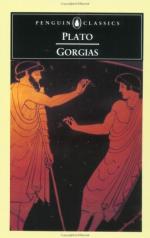
|
| Name: _________________________ | Period: ___________________ |
This test consists of 15 multiple choice questions and 5 short answer questions.
Multiple Choice Questions
1. Callicles criticizes Socrates because he believes what influences Socrates?
(a) Other philosophers.
(b) Convention.
(c) Delusion.
(d) Books.
2. What kind of knowledge does Socrates think helps men determine good and bad pleasures?
(a) Professional.
(b) Spiritual.
(c) Political.
(d) Limited.
3. What, according to Socrates, is the only way for remarks like Callicles' to be credible?
(a) If the person is knowledgeable.
(b) If the person is fearless.
(c) If the person has good intentions.
(d) If the person has experience.
4. Socrates explains that to escape injustice, one must ______ injustice.
(a) Practice.
(b) Ignore.
(c) Prevent.
(d) Define.
5. In Socrates' opinion, what does a sick body not need an abundance of?
(a) Food.
(b) Criticism.
(c) Company.
(d) Help.
6. In Socrates' opinion, why should a wretched body be deprived of life?
(a) To spare it pain.
(b) Because its life is also wretched.
(c) Because it corrupts society.
(d) Because it is depressing.
7. What does Callicles think satisfaction leads to?
(a) Superiority.
(b) Indulgence.
(c) Envy.
(d) Indifference.
8. In Callicles opinion, what does legislation defend?
(a) Children.
(b) Weak people.
(c) Superior people.
(d) Lawmakers.
9. What is Socrates' opinion of the purpose of cookery?
(a) To create pleasure.
(b) To display skill.
(c) To feed people.
(d) To enhance life.
10. Socrates believes that a soul in harmony is what?
(a) Critical.
(b) Confused.
(c) Self-righteous.
(d) Lawful.
11. What does Socrates claim is the greatest evil in Chapter IV?
(a) Cowardice.
(b) Disharmony.
(c) Violence.
(d) Power.
12. Socrates believes bad people feel what?
(a) Glorious.
(b) Good.
(c) Fear.
(d) Pain.
13. Why does Socrates believe people with lack of self-control cannot maintain friendships?
(a) Because they betray people.
(b) Because they cannot share.
(c) Because they scare people.
(d) Because they are flakey.
14. What does Callicles believe is the true order between men?
(a) All men are equal.
(b) Intellect determines superiority.
(c) Those who are compassionate are superior.
(d) Natural strength determines superiority.
15. In Callciles' opinion, why is philosophy destructive?
(a) It encourages separatism.
(b) It deprives people of experience.
(c) It takes away from productivity.
(d) It justifies evils.
Short Answer Questions
1. What does Socrates often call good things?
2. Who is inferior in Callicles' opinion?
3. Why does Socrates try to test Callicles?
4. According to Callicles, where does happiness come from?
5. Why does Callicles regard philosophy as dangerous?
|
This section contains 393 words (approx. 2 pages at 300 words per page) |

|




